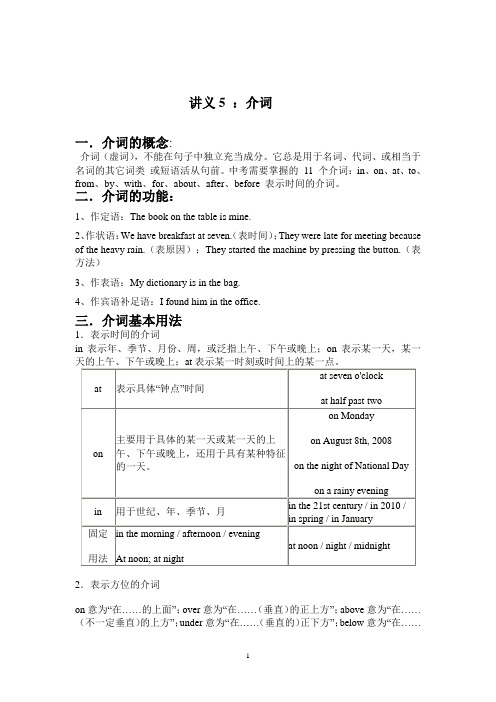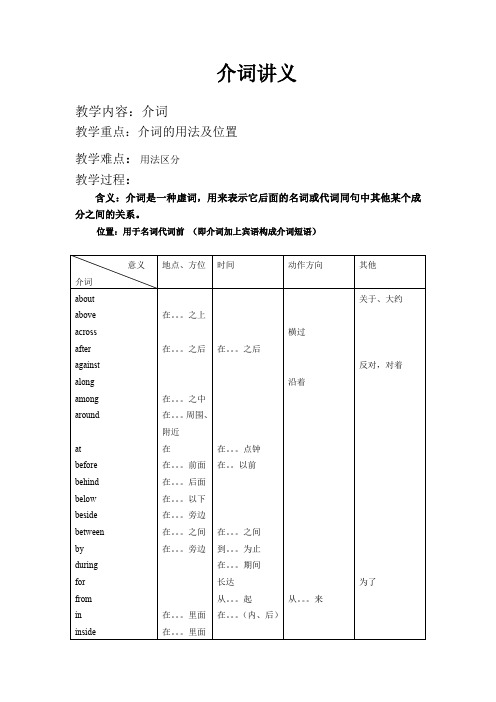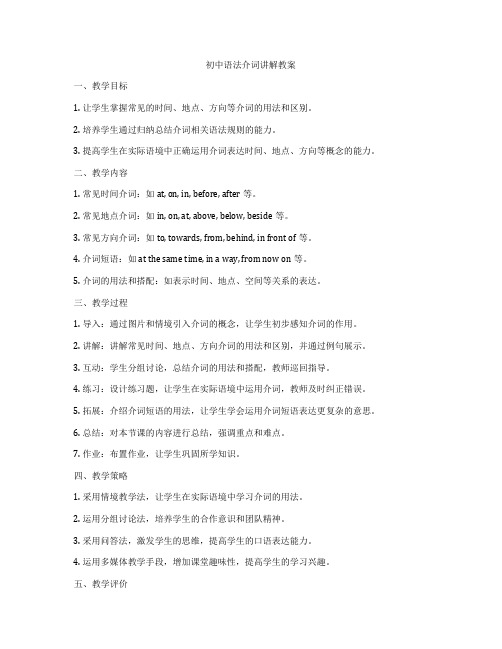初中英语常用介词短语搭配讲课讲稿
中考英语专题四介词和介词短语课件演示文稿

8:00 this morning.
A. at
B. for
C. since D. till
解析:since后跟过去的时间点,表示一段时间,常与现在完成时
连用。
答案: C。
第15页,共49页。
考点二 表示空间的介词
Ⅰ.基本用法
介词
用法 at, on, in & to
例词/句
at
在 …… ( 里 面 或 附 近)。可用于小地点
in
等词前。
in the morning 在早上
用在表示年龄段的 数词前。
in his fifties 在他50多岁时
后面接一段时间, 表示“在……之 后”,多用于将来 时。
We are going to Guangzhou in two days. 我们准备两天内去 广州。
第4页,共49页。
介词
介词
用法
例词/句
用于钟点、中午、 at five o’clock 5点时
夜晚、拂晓、黄昏 at noon 在中午
等词前面。
at night 在晚上
at
at the beginning of 在开始
用在一些固定短语 at the end of 在末尾
中。
at the same time 同时
at the age of 在……岁时
第3页,共49页。
介词
用法
例词/句
用在表示世纪、年 in the twenty’first century 在21
代、年份、季节、 世纪
月份等的名词前; in the 1880s 在19世纪80年代
用在不特定的上午、in 1983 in winter 在1983年冬天
九年级英语专题复习教案:介词和介词短语知识讲解(中考资料)

教案编辑专员:九年级英语专题复习教案:介词和介词短语知识讲解(中考资料)章节一:介词的分类和用法教学目标:1. 理解介词的分类及基本用法。
2. 能够正确运用介词表达时间、地点、方向等概念。
教学内容:1. 介词的分类:时间介词、地点介词、方向介词等。
2. 常见介词的用法举例。
教学活动:1. 讲解介词的分类及用法。
2. 学生练习运用介词完成句子。
章节二:介词短语的构成和用法教学目标:1. 掌握介词短语的构成方法。
2. 能够正确运用介词短语表达各种概念。
教学内容:1. 介词短语的构成:介词+名词/代词。
2. 常见介词短语的用法举例。
教学活动:1. 讲解介词短语的构成及用法。
2. 学生练习运用介词短语完成句子。
章节三:介词和介词短语的辨析教学目标:1. 能够辨析不同介词和介词短语的用法。
2. 正确选择合适的介词或介词短语表达意思。
教学内容:1. 辨析常见介词和介词短语的用法。
2. 练习题:判断句子中空格应填的介词或介词短语。
教学活动:1. 讲解介词和介词短语的辨析方法。
2. 学生练习判断句子中空格应填的介词或介词短语。
章节四:介词和介词短语在阅读理解中的应用教学目标:1. 提高学生运用介词和介词短语理解阅读材料的能力。
2. 增强学生对介词和介词短语在语境中意义的理解。
教学内容:1. 介词和介词短语在阅读理解中的重要性。
2. 练习题:根据阅读材料选择合适的介词或介词短语。
教学活动:1. 讲解介词和介词短语在阅读理解中的应用。
2. 学生练习根据阅读材料选择合适的介词或介词短语。
章节五:介词和介词短语在写作中的应用教学目标:1. 提高学生运用介词和介词短语进行写作的能力。
2. 使学生能够正确使用介词和介词短语表达各种概念。
教学内容:1. 介词和介词短语在写作中的重要性。
2. 练习题:运用介词和介词短语完成写作任务。
教学活动:1. 讲解介词和介词短语在写作中的应用。
2. 学生练习运用介词和介词短语完成写作任务。
初中英语常见介词讲义

讲义5 :介词一.介词的概念:介词(虚词),不能在句子中独立充当成分。
它总是用于名词、代词、或相当于名词的其它词类或短语活从句前。
中考需要掌握的11 个介词:in、on、at、to、from、by、with、for、about、after、before 表示时间的介词。
二.介词的功能:1、作定语:The book on the table is mine.2、作状语:We have breakfast at seven.(表时间);They were late for meeting because of the heavy rain.(表原因);They started the machine by pressing the button.(表方法)3、作表语:My dictionary is in the bag.4、作宾语补足语:I found him in the office.三.介词基本用法1.表示时间的介词in表示年、季节、月份、周,或泛指上午、下午或晚上;on表示某一天,某一2.表示方位的介词on意为“在……的上面”;over意为“在……(垂直)的正上方”;above意为“在……(不一定垂直)的上方”;under意为“在……(垂直的)正下方”;below意为“在……(不一定垂直)的下方”;near意为“在……附近”;next to意为“紧挨着……”;round / around意为“在……周围”;by意为“在……旁边”;表示两者的位置关系时in表示“在同一区域内或同一范围内”;on表示“接壤;相邻”;to表示“相离;相隔”,两者不属同一范围,也不接壤。
3.表示延续时间的介词by意为“在……之前;不迟于……”;for意为“历时……之久;持续……”;in 意为“在……以后;在……时间内”;since意为“自从……以来;自……以后”;until 用于否定句中,意为“直到……才”,其前的谓语动词多为非延续性动词,用在肯定句中,意为“直到……为止”,其前谓语动词须用延续性动词。
中考英语介词讲义

介词讲义教学内容:介词教学重点:介词的用法及位置教学难点:用法区分教学过程:含义:介词是一种虚词,用来表示它后面的名词或代词同句中其他某个成分之间的关系。
位置:用于名词代词前(即介词加上宾语构成介词短语)短语介词:介词+。
+介词:in front of 在。
前面副词+。
+介词:out of 从。
向外固定搭配:动词+。
介词:look after;take care of照顾;照看例题解析1. ---What time did you get there this morning?--- _________ eight.A. InB. OnC. AtD. From2. He has got a chair to sit _______, but nobody to talk ________.A. on, toB. / , withC. on, /D. / , to Where’s Lily? We are all here ________ her.A. besideB. aboutC. exceptD. with Shanghai lies ________ the east of China.A. toB. inC. onD. at习题练习:用适当的介词填空:Last Saturday I was busy ______ my homework .My teacher was very angry ______ me because I was late ______ school again.Kathy prefers a hula hoop ______ a book.I will invite some friends ______ my eighteenth birthday party.How long has he worked ______ an inventor.My uncle arrived ______ the airport ______ the morning of May 3.I will always help my friends when they are ______ trouble.There is nothing ______ air ______ space.I won’t be back ______ June.______ the age ______ twenty, he had written two books.Mary fell ______ her bike and hurt her right leg.He has been away ______ China ______ three years ago.When I was ______ school, I was ______ the school football team.I think he will be ______ two o’clock.The teacher was given some flowers ______ his students.Look, the birds are singing ______ the tree.He left the classroom ______ all the windows open.My sister is ill today. She doesn’t feel ______ eating anything.It’s too dangerous. You must keep the children away ______ the fire.My parents arrived ______ a cold night.You should apologize ______ her ______ stepping on her foot.The students are sitting ______ the table, reading the newspaper.The city is famous ______ its football, and people there are very proud ______ their city football team.We are doing better ______ English ______ our teacher’s help.Don’t worry ______ me. Everything is going well ______ me.He was late ______ school today, and she came late ______school, too.------ Do you know what happened ______ Peter yesterday?------ He was hit ______ a car.I like clothes made ______ cotton.He will go to Hangzhou ______ his car tomorrow.______ my surprise, the Englishman gave up halfway ______the end.I saw the great changes ______ my own eyes.You look tired. Instead ______ working indoors you should beout ______ a walk.Wushu is becoming more and more popular ______ foreigners.If you are able to get the tickets tomorrow, please tell me ______phone.There is going to be a report ______ Chinese history ______ ourschool this evening.Before 1990 there was no airline ______ the two cities.She is dressed ______ a white skirt ______ red flowers.It’s bad ______ you to go to work ______ break fast.It’s very nice ______ you to get me two tickets ______ the WorldCup.------ Where have you been these days?------ I have been to Bei Daihe ______ a friend ______ Canada.------ Would you like some coffee?------ Yes, and please get me some milk, too. I prefer coffee ______ milk.------ When did Mr Smith come here?------ ______ nine o’clock yesterday morning.You must stand ______ line when you are waiting ______ a bus.------ Jack, will you be home ______ time to see the children before they go to bed?------ No problem.China lies ______ the east of Asia and ______ the North of Australia.46. If you can’t pass the exam, you’ll fall ______ others.47. I have a swim every day ______ yesterday.48. We all know that the earth moves ______ the sun.49. The sunlight is coming in ______ the window.50. This room is full______students and that one is filled______ teachers.。
初中语法介词讲解教案

初中语法介词讲解教案一、教学目标1. 让学生掌握常见的时间、地点、方向等介词的用法和区别。
2. 培养学生通过归纳总结介词相关语法规则的能力。
3. 提高学生在实际语境中正确运用介词表达时间、地点、方向等概念的能力。
二、教学内容1. 常见时间介词:如at, on, in, before, after等。
2. 常见地点介词:如in, on, at, above, below, beside等。
3. 常见方向介词:如to, towards, from, behind, in front of等。
4. 介词短语:如at the same time, in a way, from now on等。
5. 介词的用法和搭配:如表示时间、地点、空间等关系的表达。
三、教学过程1. 导入:通过图片和情境引入介词的概念,让学生初步感知介词的作用。
2. 讲解:讲解常见时间、地点、方向介词的用法和区别,并通过例句展示。
3. 互动:学生分组讨论,总结介词的用法和搭配,教师巡回指导。
4. 练习:设计练习题,让学生在实际语境中运用介词,教师及时纠正错误。
5. 拓展:介绍介词短语的用法,让学生学会运用介词短语表达更复杂的意思。
6. 总结:对本节课的内容进行总结,强调重点和难点。
7. 作业:布置作业,让学生巩固所学知识。
四、教学策略1. 采用情境教学法,让学生在实际语境中学习介词的用法。
2. 运用分组讨论法,培养学生的合作意识和团队精神。
3. 采用问答法,激发学生的思维,提高学生的口语表达能力。
4. 运用多媒体教学手段,增加课堂趣味性,提高学生的学习兴趣。
五、教学评价1. 课堂参与度:观察学生在课堂上的积极参与情况和合作意识。
2. 练习正确率:检查学生练习题的正确率,了解学生对知识的掌握程度。
3. 作业完成情况:关注学生作业的完成质量,巩固所学知识。
4. 学生反馈:听取学生的意见和建议,不断改进教学方法。
六、教学反思本节课结束后,教师应认真反思教学效果,针对学生的掌握情况,调整教学策略,以提高学生的英语语法水平。
介词的用法 初中教案

介词的用法初中教案教学目标:1. 让学生掌握常用的介词及其用法。
2. 培养学生正确使用介词的能力。
3. 提高学生对英语语法的认识和运用能力。
教学内容:1. 介词的定义和作用2. 常用介词及其用法3. 介词的搭配和注意事项教学过程:一、导入(5分钟)1. 引导学生回顾已学的动词、名词和形容词,提醒学生这些词需要与介词搭配才能完整表达意思。
2. 提问:什么是介词?它在句子中起什么作用?二、讲解介词的定义和作用(10分钟)1. 解释介词的概念:介词是一种用来连接名词、代词或名词性短语的词,它通常放在名词、代词或名词性短语之前。
2. 强调介词在句子中的作用:介词可以表示时间、地点、方向、原因、方式等概念。
三、学习常用介词及其用法(15分钟)1. 列出常用介词:about, above, after, along, among, before, behind, below, beyond, but, by, for, from, in, into, like, near, of, off, on, onto, out, over, past, toward, under, until, up, with, without。
2. 针对每个介词进行举例讲解,让学生理解并掌握其用法。
四、介词的搭配和注意事项(10分钟)1. 讲解介词与其他词类的搭配,如:介词+名词、介词+代词、介词+动词等。
2. 提醒学生注意介词的搭配习惯,避免错误使用。
五、练习与巩固(10分钟)1. 学生分组,互相练习使用介词构造句子。
2. 教师选取一些学生构造的句子,进行点评和纠正。
六、总结与作业(5分钟)1. 教师总结本节课所学内容,强调介词的重要性和用法。
2. 布置作业:让学生课后用所学介词构造五个句子,并写在日记中。
教学反思:本节课通过讲解介词的定义、作用和常用介词的用法,使学生掌握了介词的基本知识。
在教学过程中,注意举例生动、贴近生活,让学生能够更好地理解和运用介词。
初中介词短语教案
初中介词短语教案一、教学目标:1. 让学生掌握常用的介词短语,如:in front of, behind, next to, on the left of, between, etc.2. 让学生能够正确运用介词短语描述物体或人的位置关系。
3. 提高学生的英语表达能力,培养学生的观察力和想象力。
二、教学内容:1. 介词短语的定义和用法。
2. 常用介词短语的列举和解释。
3. 介词短语的练习和应用。
三、教学步骤:1. 引入新课:通过一幅图片,引导学生观察并描述图片中物体或人的位置关系。
例如:“The cat is behind the tree.”“The boy is next to the girl.”2. 讲解介词短语:解释介词短语的概念,并逐一讲解常用介词短语的用法。
如:in front of (在……前面),behind(在……后面),next to(在……旁边),on the left of(在……左边),between(在……之间)等。
3. 举例练习:给出一些句子,让学生用所学的介词短语进行填空练习。
如:“The dooris______the window.”(在……旁边)、“The book is______the table.”(在……上面)等。
4. 小组活动:学生分组,用卡片写出介词短语,然后互相描述卡片上的物体或人的位置关系。
如:“My card has a cat______a tree.”(我的卡片上有一只猫______一棵树。
)5. 游戏环节:设计一个“找出不同”的游戏,让学生在图片中找出使用不同介词短语的物体或人。
如:“Find the different between the t wo pictures. One picture has a cat______a tree, and the other picture has a cat______a pillow.”6. 总结与拓展:回顾本节课所学的介词短语,让学生举例说明这些介词短语在实际生活中的应用。
完整)初中语法介词讲解
完整)初中语法介词讲解介词和介词短语介词是一种虚词,根据其意义可分为地点介词、时间介词、方位介词、手段介词和其他介词等。
表示时间的介词有:at、in、on、before、to、from、by、till、until、after、for、since 等。
表示地点、位置和方向的介词有:next to、in、in front of、on、out of、at、above、over、into、near、een、under、up、across、by、down、from、around、behind、beside等。
表示原因和理由的介词有:for、as、at、from等。
表示方式的介词有:on、in、by、with等。
常用介词辨析1.表示时间的介词in、on、at、afterin的用法:用于描述早晨、下午和傍晚:XXX。
用于描述月份、年份和季节等:In March。
in 1986.in spring。
用于描述一段时间之后:In a week。
in a year’s time。
in two hours。
on的用法:用于具体某一天:XXX。
on the morning of next Friday。
on June 6.on Sunday。
on New Year’s Day。
用于描述性的时间:On a cold night。
on a winter day。
at的用法:用于具体的钟点:At 12 o’clock。
at half nine。
用于固定的搭配:XXX。
XXX。
XXX。
at noon。
at Christmas。
at weekends。
at that time。
XXX表示在一点时间以后:XXX’clock。
2.表示地点的介词in、on、atin指的是大地方,at是小地点。
in表示的是体,on表示的是面,at表示的是点。
in可指内部,on可指“在…之上”。
例如:There are six windows in the wall.(墙上有6扇窗子。
介词短语的优秀教案设计
介词短语的优秀教案设计一、教学目标1. 知识目标(1)让学生掌握常用的介词短语,如:in front of, behind, next to, on the left/right, above, below等。
(2)让学生学会运用介词短语描述物体位置和方向。
2. 能力目标(1)培养学生运用英语进行交流的能力。
(2)培养学生观察、描述和推理的能力。
3. 情感目标(1)激发学生学习英语的兴趣。
(2)培养学生的团队合作精神。
二、教学内容1. 教材内容本节课选用《新目标英语》八年级上册Unit 4 Section B 1b-2c作为教学内容,主要学习介词短语 in front of, behind, next to, on the left/right, above, below等。
2. 教学重难点(1)掌握常用介词短语。
(2)学会运用介词短语描述物体位置和方向。
三、教学方法1. 任务型教学法:通过完成各种任务,让学生在实践中学习和运用介词短语。
2. 情境教学法:创设生活情境,让学生在真实的环境中学习介词短语。
3. 合作学习法:鼓励学生分组合作,培养学生的团队合作精神。
四、教学步骤1. 导入(1)利用图片或实物,引导学生复习已学的介词短语。
(2)引入本节课要学习的介词短语。
2. 呈现(1)通过图片或实物,展示本节课要学习的介词短语。
(2)引导学生观察和描述图片或实物中的物体位置和方向。
3. Practice(1)让学生进行pair work,用所学的介词短语描述物体位置和方向。
(2)选取几组学生进行展示,给予评价和反馈。
4. 任务(1)分组完成任务:每组设计一个场景,使用所学的介词短语描述场景中的物体位置和方向。
(2)选取几组进行展示,给予评价和反馈。
5. 总结(1)回顾本节课所学的内容,总结介词短语的用法。
(2)鼓励学生在日常生活中多运用所学的介词短语。
六、作业设计1. 抄写并背诵本节课所学的介词短语。
《介词用法总结》课件
介词与其他词类的 搭配关系
介词使用时的注意 事项
介词在不同语境中的应用
介绍介词的种类和用法 介词在不同语境中的选择和使用 介词与其他词类的搭配和组合 介词在不同语言中的差异和特点
介词用法的总结与练习
介词用法的总结
介词的定义和作用
常见介词的用法和搭配
介词与其他词类的关系
介词的辨析和选择
介词用法的练习题
名词+介词:表示所属、来源等 介词的 辨析
介词的辨析
不同介词的相同用法
单击此处输入你的正文,请阐述观点
近义介词的辨析
近义介词的辨析:辨析介词“在…上”与“在…下” 近义介词的辨析:辨析介词“对…来说”与“对…来说” 近义介词的辨析:辨析介词“由于”与“因为” 近义介词的辨析:辨析介词“关于”与“对于”
引导方式状语
作用:帮助明确句子的逻辑 关系,使句子更加清晰易懂
常见介词:用、以、按照、 根据等
定义:介词在句子中作为引导 词,用来表示行为或状态的方 式
例子:他以这种方式完成了 任务;我们按照计划行事。
引导目的状语
定义:介词在句子中引导目的状语,表示动作的目的或方向 用法:介词+名词/代词+动词/形容词 例子:为了学习英语,他每天早起读书 注意事项:避免使用重复的介词,注意介词与动词的搭配
介词的用法:介词后面通常接名词或代词,构成介宾短语,在句子中充当状语或补语。
简单介词 合成介词 二重介置 表示方向 表示目标
at的用法
in的用法
表示在某个范围或 方面之内
表示在某个时间或 时刻之内
表示在某个位置或 状态之内
表示在某个团体或 组织之内
请用适当的介词填空:在、从、到、向、沿 请用适当的介词填空:为了、在...下、在...中、在...上 请用适当的介词填空:除了、以外、以...方式 请用适当的介词填空:按照、根据、依照
- 1、下载文档前请自行甄别文档内容的完整性,平台不提供额外的编辑、内容补充、找答案等附加服务。
- 2、"仅部分预览"的文档,不可在线预览部分如存在完整性等问题,可反馈申请退款(可完整预览的文档不适用该条件!)。
- 3、如文档侵犯您的权益,请联系客服反馈,我们会尽快为您处理(人工客服工作时间:9:00-18:30)。
初中英语常用词组复习一、动词词组(包括短语动词)、介词词组和其他词组(一) 由be构成的词组2)be at home/work在家/上班3)be good at善于,擅长于4)be careful of当心,注意,仔细7)be surprised (at)对⋯⋯感到惊讶10)be on在进行,在上演,(灯)亮着11) be able to do sth.能够做⋯⋯12) be afraid of (to do sth. that⋯)恐怕⋯⋯13) be angry with sb.生(某人)的气14)be pleased (with)对⋯⋯感到高兴(满意)15)be famous for/ as 以⋯⋯而著名/作为····而出名16)be strict in (with) (对工作、对人)严格要求20)be (well) worth doing (非常)值得做⋯⋯21)be covered with被⋯⋯所覆盖⋯⋯22)be in (great) need of (很)需要23)be in trouble处于困境中24) be glad to do sth.很高兴做⋯⋯25)be late for ⋯⋯迟到26)be made of (from)由⋯⋯制成27)be satisfied with对⋯⋯感到满意30)be busy doing (with)忙于做⋯⋯(忙于⋯⋯)(二)由come、do、get、give、go、have、help、keep、make、look、put、set、send、take、turn、play等动词构成的词组1. come1)come back回来2)come down下来3)come in进入,进来4)come on快,走吧,跟我来5)come out出来6)come out of从⋯⋯出来7)come up上来8)come from来自⋯⋯2. do9)do one's lessons/homework做功课/回家作业11)do one's best尽力12)do some shopping (cooking reading, cleaning)买东西(做饭菜,读点书,大扫除)16)do well in在⋯⋯某方面干得好3. get17)get up起身20)get on (well) with get alone with与⋯⋯相处(融洽)24)get on/off上/下车25)get to到达4. give27)give sb. a call给⋯⋯打电话30)give back归还,送回31)give⋯⋯some advice on给⋯⋯一些忠告33)give in屈服34)give up放弃5. go38)go to the cinema看电影39)go to bed睡觉(make the bed整理床铺)40)go to school (college)上学(上大学)42)go over过一遍,复习/ go over to朝⋯⋯走去47)go out for a walk外出散步48)go on (doing)继续(做⋯⋯)49)go on with one's work继续某人的工作6. have55)have a try试一试56)have a good/wonderful time玩得很高兴60)have breakfast/lunch/supper吃早饭/午饭/晚饭64)have (have got) a headache头痛65)have a fever发烧66)have a cough (a cold)咳嗽(感冒)</P< p>67)have a look (at)看一看⋯⋯68)have a rest (a break)休息一会儿(工间或课间休息)71)have sports进行体育锻炼仅供学习与参考73)have something done让人(请人)做⋯⋯76)had better do sth. (not do sth.)最好做⋯⋯(最好不要做⋯⋯)7. help78)help sb. with sth/ help sb. do sth.在⋯⋯方面帮助⋯⋯帮助⋯⋯做80)help each other互相帮助8. keep81)keep up with跟上⋯⋯,不落后于⋯⋯83)keep sb. doing sth.使⋯⋯一直做⋯⋯9. make86)make a living谋生87)make sb. do sth.迫使某人做⋯⋯89)make friends (with)与⋯⋯交朋友91)make room/space for给⋯⋯腾出地方94)be made from/of由⋯⋯制成95)be made in在⋯⋯地方制造10. look96)look out of (outside)往外看(看外面)97)look up a word (in the dictionary)查字典99)look after照管,照看,照顾100)look for寻找look over 调查106)look at看着⋯⋯11. put107)put on穿上(衣服),戴上(帽子),上演(戏剧)110)put one's heart into全神贯注于111)put⋯down⋯把⋯⋯放下12. set113)set up竖起,建起114)set off出发,动身115)set out出发116)set an example for为⋯⋯树立榜样13. send117)send for派人去请(叫)118)send out放出,发出119)send up把⋯⋯往上送,发射14. take 123)take place发生127)take it easy别紧张130)take care of关心,照顾,保管136)take off脱下(衣,帽,鞋等)拿掉137)take (an active) part in (积极)参加(活动15. turn141)turn on开,旋开(电灯,收音机等) 142)turn off关上(电灯,收音机等) 143)turn in交出,上交146)turn down (把音量)调低16. play149)play games做游戏150)play the piano (the violin)弹钢琴(拉小提琴)(三)由其他动词构成的词组153)think over仔细考虑154)arrive at/in a place到达某处156)do well in在⋯⋯干得好157)enjoy doing sth. / like doing sth.喜欢做某事喜欢干某事158)find out发现,查出(真相等)160)stop doing sth.停止做某事161)stop to do sth.停下来去做某事164)hurry up赶快,快点166)laugh at嘲笑167)be used to doing sth 习惯于168)used to过去常常169)wake⋯up唤醒170)work out算出二、动词短语、介词短语和其他词组1)ask for向⋯⋯要⋯⋯,请求4)pay for付⋯⋯的款5)wait for等候6)thanks for为⋯⋯感谢8)look for寻找9)leave⋯for离开⋯⋯去⋯⋯12)catch up with赶上13)agree with sb.赞成,同意某人的意见14)filled⋯⋯with把⋯⋯装满15)tell sb. about sth.告诉某人某事17)think about担忧⋯⋯18)worry about考虑⋯⋯仅供学习与参考19)look after照料23)knock at敲(门、窗)24)shout at对⋯⋯大喊(嚷)25)throw away扔掉28)change⋯into⋯变成30)run into⋯跑进31)hear of听说32)think of认为,考虑34)instead of代替⋯⋯35)hand in交上来37)hear from收到⋯⋯来信40)at first起先,首先41)at the age of⋯在⋯⋯岁时42)at the end of⋯在⋯⋯之末43)at the beginning of⋯在⋯⋯之初45)at the same time同时48)with the help of ⋯在⋯⋯的帮助下52)from now on从现在起53)from then on从那时起54)for example例如55)far away from远离65)in fact事实上66)in one's twenties在某人二十几岁时67)in a hurry匆忙68)in the middle of在⋯⋯中间69)in no time (in a minute)立刻,很快70)in time (on time)及时71)in public公众,公开地72)in order to为了⋯⋯73)in front of在⋯⋯前面74)in the sun在阳光下75)in the end最后,终于仅供学习与参考。
